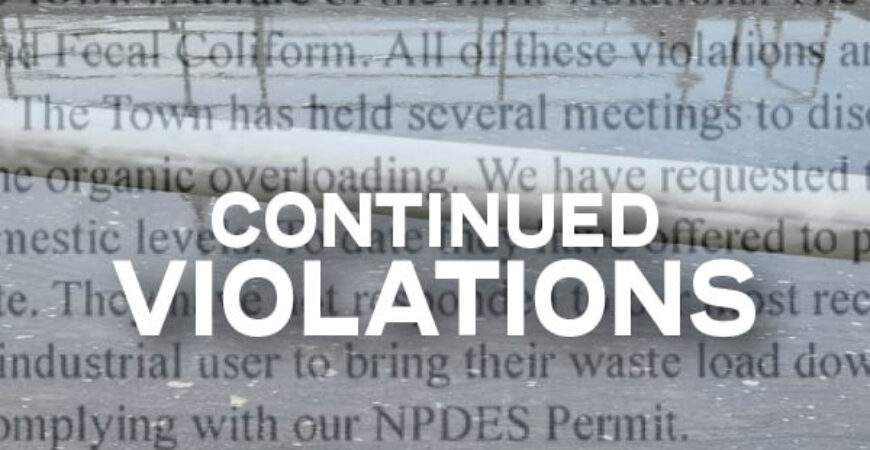Villari proposed a 2027 compliance deadline for a pretreatment facility as the town grapples with fines
WARSAW — The Warsaw Wastewater Treatment Plant continues to accumulate fines as the facility struggles with organic overload.
Last week after learning about reports of a foul smell in various areas across Warsaw, Duplin Journal reached out to Town Manager Lea Turner to inquire about the origins. “We’re still identifying the problem and a solution to the problem,” Turner said.
According to NC Department of Environmental Quality documents obtained by Duplin Journal, on Jan. 29, the DEQ issued a notice of violation and assessment of civil penalties totalling $9,933 for violations of wastewater quality standards last October. The process from violation notice to fee assessment can sometimes take up to a few months. According to the WWWT plant’s annual performance report the treatment plant failed to meet DEQ standards 8 months out of the year. From January 2024 through January 2025 Warsaw has been racking up fines totalling $75,521.11.
The latest document notes fecal coliform exceeded both weekly and monthly limits, with some weeks showing more than five times the weekly allowed and more than nine times the monthly limits. Ammonia concentrations also exceeded the permitted values, with both weekly and monthly averages surpassing the limit by 43.3% and 160.7%, respectively. According to the US Environmental Protection Agency excessive ammonia can be a sign of organic overload in the treatment process, which can affect the biological processes used to treat wastewater.
A letter from the town of Warsaw to the Water Quality Regional Operations Section dated Jan. 7 in response to a violation notice issued in December confirmed that the treatment plant is “organically overloaded.”
This means that the wastewater being sent to the treatment plant has more organic waste than the plant is designed to handle.
“The town has held several meetings to discuss this issue with a significant industrial user, Villari Food Group, LLC which is providing the organic overloading,” stated the letter signed by Turner. “We have requested them to advise how they can bring their wastewater down to domestic levels. To date they have offered to provide a second DAF [Dissolved Air Flotation] Unit, and have acknowledged that the pretreatment facilities will still not be able to significantly reduce their organic loading.”
According to the DEQ document, on Dec. 13, Villari submitted a schedule of compliance application to the town with a proposed timeline for bringing their pretreatment facilities into compliance.
The proposed schedule gives the industrial user until June to isolate and characterize wastewater streams. It gives them from July 1 to Sept. 30 to develop engineering plans, and from Oct. 1 through the end of December to secure funding and hire a contractor.
The timeline also gives Villari until Dec. 31, 2026 for construction of their pretreatment facility, with a final deadline of Feb. 1, 2027 to have the facility fully functional.
The letter also stated that the town of Warsaw will continue to have problems complying with the permit until Villari brings their waste load down.
For the past few months Commissioner Ebony Willis Wells has raised significant concerns about the condition of the Warsaw Wastewater Treatment Plant through her social media posts and public statements.
On Jan. 31, the commissioner shared photos of the treatment plant on social media, reporting that industrial discharges have contributed to the plant’s continued decline.
For the past few years Warsaw officials have indicated the dire need for upgrades to the treatment plant to the tune of $44 million to address its deficiencies.
Wells called on her fellow local officials to take a firm stance on enforcing regulations and advocating for greater accountability. The commissioner encouraged others to engage in conversations with fellow leaders to find solutions and ensure that the town takes action to solve this problem and not just rely on legislative funding for help.
“I encourage all who ask me to knock on my fellow cohorts doors and get [their] feedback on #Accountability and how this issue can be fixed. And don’t let them shoot the blame on legislative leaders [for] not sending us the $44 [million]. As that isn’t the solution to the true problem of our treatment plant. That is just one solution,” she wrote.
 Twitter
Twitter Facebook
Facebook Instagram
Instagram





